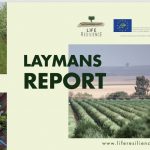 Xylella fastidiosa (XF) is a devastating bacterium with a significant pathogenic potential on different types of plants such as olive, almond and citrus trees, which arrived in Spain in 2016 where several producing areas have been affected (Alicante, Madrid and Balearic Islands).
Xylella fastidiosa (XF) is a devastating bacterium with a significant pathogenic potential on different types of plants such as olive, almond and citrus trees, which arrived in Spain in 2016 where several producing areas have been affected (Alicante, Madrid and Balearic Islands).
Faced with this situation, several organisations in Spain, Italy and Portugal decided in 2018 to launch the LIFE Resilience project. A project co-funded by the European Union (EU) LIFE programme created to develop crop models capable of combating the Xylella fastidiosa bacterium in both olive and almond farms.
The project is made up of nine partners: Balam Agriculture, the University of Cordoba (UCO), Agrifood Comunicación, Greenfield Technologies, ASAJA Nacional, Nutriprado, SAHC-Sociedad Agrícola de Herdade do Charqueirao, S.A.; Villa Filippo Berio and the Institute of Bioeconomics (IBE), belonging to the Consiglio Nazionale Delle Ricerche (CNR) of Italy.
Four years of intense work to achieve a replicable model of best practices in the entire Mediterranean basin, whose actions and achievements during this time are included in the Layman’s Report prepared by the partners. Among the milestones achieved are the obtaining of 18 genotypes potentially resistant to Xylella fastidiosa, the benefits achieved with plant covers as nitrogen providers to the soil, the replication of their good practices or the reduction of CO2 emissions and their water footprint.
In addition, the partners of this initiative have produced a video highlighting the importance of the Life Resilience project as a replicable model of sustainable practices against Xylella fastidiosa and whose results will help more than 1 million farmers in a number of countries.
To download the Layman’s Report with the results, click on this link.
To download the video summary of the project click on this link.
